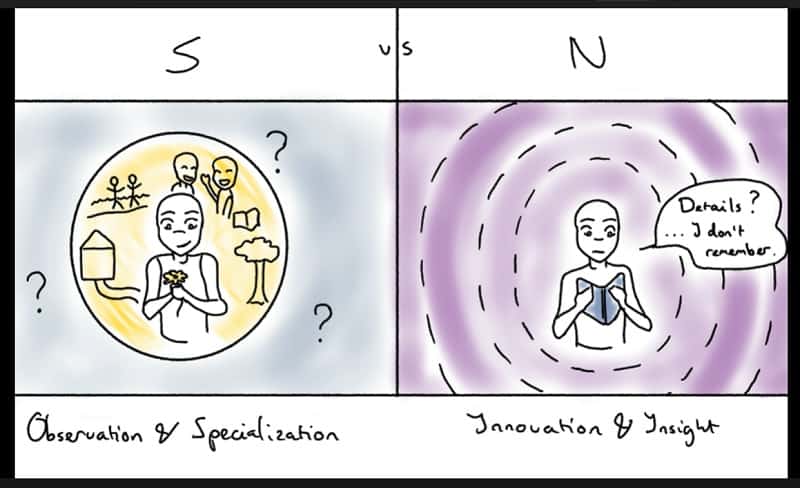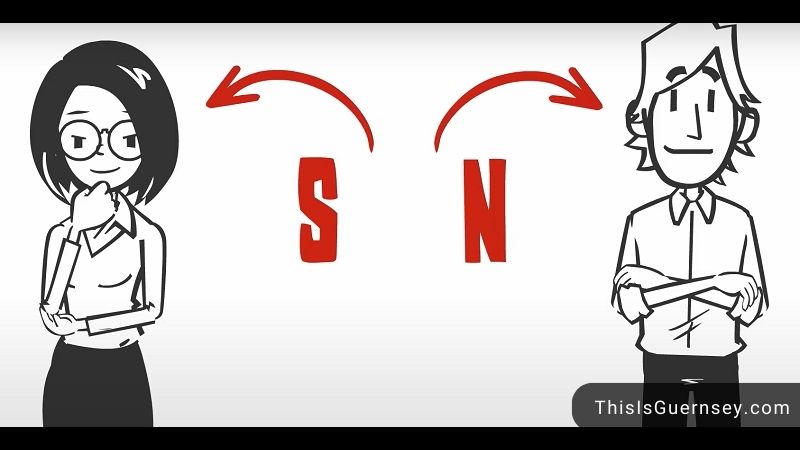If you want to know the difference between observant and intuitive personality traits, this article will provide it. In this article, the content focuses on the intuitive vs observant traits of the Myers-Briggs personality type indicator. The difference and similarity between two traits are presented, in combination with the key characteristics of each type.
Intuitive vs Observant
In the Myers-Briggs personality type indicator, also known as MBTI, the Intuitive (N) and Observant (or Sensor) (S) traits belong to the Energy personality aspect. This aspect demonstrates how people see the world and their tendency to act toward the information gathered from their surroundings.
The difference between intuitive and observant
The difference between intuitive and observant traits is that the Intuitives are seen as imaginative, curious, and open-minded individuals, while the Observants are practical and pragmatic people.
The Observants highly focus on how things are more than how things should be. They prefer observable and sensible facts and more direct outcomes to the ones requiring layering interpretation.
Meanwhile, the Intuitives focus more on the abstracts, interpreting meaning in what they see and the future possibilities. They generally like to discuss the future world could be in different views and theories.
The similarity between intuitive and observant
As Observants are known as practical individuals, it does not mean they cannot be imaginative. Intuitives own great imaginary abilities, but it does not mean they are impractical.
Both observant and intuitive people can be practical, creative, and imaginative. This means they both use their sensing and intuition, physical senses and mind, to the information in the world around them.
The key difference is how they act to the gathered information after processing. For example, both Observants and Inuitives like art exhibitions, but the Observants prefer art with a clear and direct meaning and message to an abstract one.
Thus, we can easily mistype an intuitive and an observant by using a simple question like “Which do you focus much on, the details or the big picture?” or “Do you have an interest in possibilities?” Both of those traits can have the same answer. Therefore, to realize an intuitive person or an observant (sensing) person, all we need to tell is which is the first preference, or the dominant function, of that person.

How To Tell An Observant Individual
The Observant or Sensor often uses their five senses to perceive the world. Their pay more attention to what they see, smell, hear, taste, and touch. Their thoughts concentrate on the present and realities. Hence, they are practical and like to talk in a direct and concrete way more than using metaphor. They prefer experiences to see how things work in practice and to learn from what they’ve experienced.
The personality types that have the observant trait are Sentinals (SJ – practicality, paying attention to stability, order, and security) and Explorers (SP – spontaneity, flexibility, and ingenuity).
The characteristics of the observant/sensing function
Here are some key characteristics of an observant:
- Easily remember an event that happened in the reality.
- Solving problems by hands-on working through facts to thoroughly understand the problem.
- Down-to-earth and pragmatic; looking straight to the outcomes more than the possibilities.
- Using details and facts to form the big pictures.
- Trust experiences most; experiences speak louder than words and symbols.
- Occasionally missing new possibilities because of paying too much attention to past or present facts.
- Finding yourself learning best by observing how things work in practical contexts and experiencing.
How To Tell An Intuitive Person
The Intuitives pay much attention to the meaning patterns and impressions of the information in the surrounding world. So, to them, what things are is not as critical as what things mean. They would learn best through thinking rather than experiencing. Unlike the observant, the intuitive think of the possibilities, new things, and the future more than real facts, the past, and the present. They like conceptual and abstract theories, even if they don’t surely know to apply them into practice successfully, and like using metaphor and comparisons when talking.
The personality types with the intuitive trait include Analysts (NT – excellent intellectualism, rationality, and impartiality) and Diplomats (NF – diplomatic skills, empathy, and idealism).
The characteristics of the intuitive function
Here are some key characteristics of an intuitive:
- Remember events by their impressions and meanings more than by what actually happened.
- Switching between different ideas and possibilities to solve the problem.
- Seeing the big picture before looking into the detailed facts.
- Preferring doing new and different things.
- Finding yourself trusting impressions and symbols or words more than experienced events.
- Sometimes getting yourself to dive into thoughts of new possibilities and forget to concern the approach to bring them to reality.
- Finding yourself easily getting fed up with the routine.
FAQs
Is it better to be intuitive or observant?
Both traits have strengths and weaknesses, so we cannot determine which is the better preference. The connection between the intuitive and observant types is beneficial to their life.
The intuitive could appreciate the practicality, excellent physical senses, and detail-orientation of the observant. Meanwhile, the observant could appreciate the rich imagination, the thought with plenty of new ideas and future possibilities, and the intellectual excellence in the intuitive’s nature. Moreover, both traits can access each other least preferred functions and help to strengthen them.
What personality type is the most observant?
We cannot really tell which is the most observant personality type, but if we focus on the personality types that are more observant bent, they would be the ones in the Sentinals and Explorers groups. These two groups have sensing/observant traits.
The Sentinals include the personality types of ISTJ, ISFJ, ESTJ, and ESFJ, while those of the Explorers group are ISTP, ISFP, ESTP, and ESFP.
What do Intuitives like to talk about?
As the Intuitives interested in abstract theories and thinking of philosophy and underlying meanings, they will like to talk about new and innovative ideas or theories.
Video: What’s My Personality: Sensing or Intuition?
References:
- https://www.16personalities.com/articles/energy-intuitive-vs-observant
- https://www.myersbriggs.org/my-mbti-personality-type/mbti-basics/sensing-or-intuition.htm
Related Search to “intuitive vs observant”
- What is a intuitive personality?
- What is an observant personality type?
- What personality type is the most observant?
- How can you tell if someone is intuitive?
- What is the rarest personality type?
- What does it mean if you’re intuitive?
- Are you an intuitive or a sensor?
- How do you know if your intuition is strong?
- How can I tell if Im intuitive?
- How do I know if I’m a sensor?
- What is sensor personality?

Tracy M. Hall was born in 1995 and studies society, human behavior, and mentality. She’s captivated by people’s interactions and motivations. After studying sociology, she got a Ph.D. in social psychology from Carnegie Mellon University. She wrote about human interaction, separation, and the future.
Tracy M. Hall is a social butterfly who likes meeting new people. She’s a superb listener and often acts as a confidante or mediator, eager to help others. Tracy’s life is an open book; Tracy shares her experiences to benefit others. She’s a natural optimist who feels everyone has something to offer and loves helping others realize their best.
Tracy M. Hall volunteered with mental health groups for years. She’s dedicated to destigmatizing mental illness and assisting.
